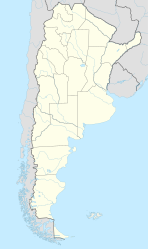Viedma, Río Negro
| Viedma | ||
|---|---|---|

Aerial view of Viedma (top) and Carmen de Patagones.
|
||
|
||
| Coordinates: 40°49′39.00″S 62°58′23″W / 40.8275000°S 62.97306°W | ||
| Country |
|
|
| Province |
|
|
| Department | Adolfo Alsina | |
| Established | 22 March 1779 | |
| Government | ||
| • Intendant | José Luis Foulkes (UCR) | |
| Elevation | 12 m (39 ft) | |
| Population (2012) | ||
| • Total | 54,779 | |
| Time zone | ART (UTC−3) | |
| Climate | BSk | |
| Website | Official website | |
Viedma (Spanish pronunciation: [ˈbjeðma]) is the capital and fourth largest city of the Río Negro Province, in South-Central Argentina. The city has 47,246 inhabitants (2001), and is located on the southern margin of the Negro River, about 30 kilometres off the Atlantic Coast, and 960 km from the city of Buenos Aires on the National Route 3.
Together with Carmen de Patagones city across the river in the Buenos Aires Province, it is the oldest settlement in Patagonia, founded by Francisco de Viedma y Narváez under the name of Nuestra Señora del Carmen on 22 April 1779. Originally the two cities were one, both called Carmen de Patagones. The original fort was built on the south side of the river in modern Viedma, but it was destroyed within a few years. A new fort was built on the north side, in the current day Carmen de Patagones. This fort lasted much longer, and the tower still stands today. The town grew here, and eventually expanded back across the river into modern day Viedma. At some point, the town decided to split with the Río Negro as their border.
With the Conquest of the Desert, the city became the capital of all the Argentine Patagonia, and later, when it was divided in further smaller territories, the capital of the Río Negro Territory. Alvaro Barros, the first governor of Río Negro, changed the name of the city to Viedma, in 1879. During severe flooding in 1900, the capital of Río Negro was temporary moved to Choele Choel, but it was quickly restored to Viedma.
During the presidency of Raúl Alfonsín, a proposal was made to move the federal capital from Buenos Aires to Viedma in 1986. This was to reduce congestion in Buenos Aires, to help develop Patagonia, and to promote the development of the interior. A bill to that effect was passed by Congress the following year, but owing to economic problems, the project had stagnated by the end of the Alfonsín administration in 1989.
...
Wikipedia


